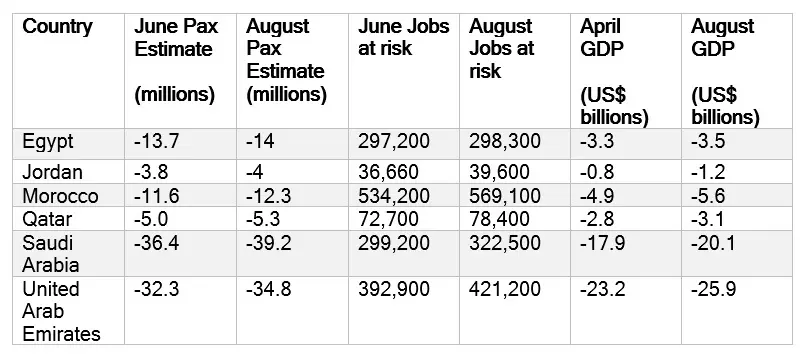(Amman) - The International Air Transport Association (IATA) released new data showing the impact on the Middle East aviation industry and on economies caused by the shutdown of air traffic due to the COVID-19 pandemic has deepened over recent weeks.
- Job losses in aviation and related industries could grow to 1.5 million. That is more than half of the region’s 2.4 million aviation-related employment and 300,000 more than the previous estimate.
- Full-year 2020 traffic is expected to plummet by 56% compared to 2019. Previous estimate was a fall of 51%.
- GDP supported by aviation in the region could fall by up to $85 billion. Previous estimate was $66 billion.
“Middle East economies have been brought to their knees by COVID-19. And without air connectivity being re-established, the socio-economic impact is getting worse. Businesses which contribute substantially to the region’s GDP and provide thousands of jobs are at risk without these vital connections. For the region’s economic recovery, it is imperative that the industry restart safely as soon as possible,” said Muhammad Al Bakri, IATA’s Regional Vice President for Africa and the Middle East.
Restarting Aviation in the Middle East
To minimize the impact on jobs and the broader Middle East economy, an accelerated recovery of air transport across the region is paramount. This can be achieved through government action in two priority areas:
- Harmonizing the restart of air transport across the region
Some countries in the Middle East are opening their borders to regional and international air travel but inconsistent application of biosafety measures along with unnecessary entry requirements are deterring passengers and suppressing the resumption of air travel. Harmonizing the restart of aviation across the region is critical for economic recovery. Governments need to implement the common global set of air transport biosecurity measures, contained in the International Civil Aviation Organization’s CART Take-off Guidelines.
- Continued financial and regulatory support
In particular, direct financial aid such as wage subsidies and loans, an extension of the waiver to the 80-20 slot rule, and relief from taxes and charges.
"We are grateful to governments which have provided relief to aviation. However, the situation is not getting better, governments need to continue applying relief measures—financial and regulatory. A regional priority is securing support in the form of wage subsidies and loans as well as an extension of the waiver for the 80-20 use-it-or-lose-it slot rule. This is needed to provide critical relief to airlines in planning schedules amid unpredictable demand patterns. Saudi Arabia has confirmed a waiver for its slot coordinated airports and we hope the UAE, Morocco and Tunisia will do so soon. Airlines need to focus on meeting demand and not meeting slot rules that were never meant to accommodate the sharp fluctuations of such a crisis,” said Albakri.
Country level impact
The latest assessment from IATA Economics shows that the outlook at the national level has worsened for major aviation markets in the Middle East since June. For example, the passenger numbers, jobs at risk and GDP impacts for the five biggest Middle East markets all have declined:


-Ends-
For more information, please contact:
Corporate Communications
Tel: +41 22 770 2967
Email: corpcomms@iata.org
- IATA (International Air Transport Association) represents some 290 airlines comprising 82% of global air traffic.
- You can follow us at https://twitter.com/iatafor announcements, policy positions, and other useful industry information.
© Press Release 2020
Disclaimer: The contents of this press release was provided from an external third party provider. This website is not responsible for, and does not control, such external content. This content is provided on an “as is” and “as available” basis and has not been edited in any way. Neither this website nor our affiliates guarantee the accuracy of or endorse the views or opinions expressed in this press release.
The press release is provided for informational purposes only. The content does not provide tax, legal or investment advice or opinion regarding the suitability, value or profitability of any particular security, portfolio or investment strategy. Neither this website nor our affiliates shall be liable for any errors or inaccuracies in the content, or for any actions taken by you in reliance thereon. You expressly agree that your use of the information within this article is at your sole risk.
To the fullest extent permitted by applicable law, this website, its parent company, its subsidiaries, its affiliates and the respective shareholders, directors, officers, employees, agents, advertisers, content providers and licensors will not be liable (jointly or severally) to you for any direct, indirect, consequential, special, incidental, punitive or exemplary damages, including without limitation, lost profits, lost savings and lost revenues, whether in negligence, tort, contract or any other theory of liability, even if the parties have been advised of the possibility or could have foreseen any such damages.



















